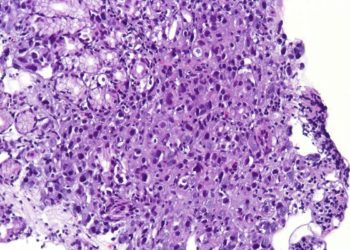Perioperative Durvalumab in Gastric and Gastroesophageal Junction Cancer
1. Event-free survival at 24 months was 67.4% in the durvalumab group and 58.5% in the placebo group, with HR 0.71 (significant).
2. Adverse events grade 3-4 occurred in 71.6% in the durvalumab group and in 71.2% in the placebo group.
Evidence Rating Level: 1 (Excellent)
Study Rundown: Most patients experience recurrence after surgery for resectable gastric and gastroesophageal junction adenocarcinomas, prompting the use of additional therapies such as perioperative FLOT chemotherapy. This study evaluated whether adding durvalumab, an anti–PD-L1 antibody, to perioperative FLOT can improve outcomes in this population. The primary endpoint was event-free survival (EFS) and secondary endpoints included overall survival (OS), pathological complete response (pCR), disease-free survival (DFS), R0 resection. A total of 86.9% in the durvalumab group and 84.4% in the placebo group had surgery completed, with 52.3% and 51.7% completed all adjuvant durvalumab or placebo, and 48.3% and 51.7% completed all the assigned adjuvant FLOT. In participants who underwent surgery, 91.5% in the durvalumab group and 92.3% in the placebo group had R0 resection. EFS at 18 months was 73.2% in the durvalumab group and 63.6% in the placebo group, and EFS at 24 months was 67.4% and 58.5%, with HR 0.71 (significant). OS at 18 months was 81.1% in the durvalumab group and 77.1% in the placebo group, OS at 24 months was 75.7% and 70.4% (non-significant). HR for death in the durvalumab group as compared with the placebo group was 0.67 (significant) at 12 months onward. Participants with pCR was 19.2% in the durvalumab group and 7.2% in the placebo group, with relative risk 2.69. With regards to safety, adverse events grade 3-4 occurred in 71.6% in the durvalumab group and in 71.2% in the placebo group, with diarrhea being most common (62.3% vs 57.6%). Immune-mediated adverse events of any grade occurred in 23.2% in the durvalumab group and in 7.2% in the placebo group, with grade 3-4 events occurring in 7.2% vs 3.6%. The strengths of this study included the methodology and number of participants, and the limitations included follow-up time. Overall, this study showed perioperative durvalumab plus FLOT was associated with some improved outcomes than placebo plus FLOT in resectable gastric and gastroesophageal junction adenocarcinomas.
Click to read the study in NEJM
Relevant Reading: Pattern of recurrence and overall survival in esophagogastric cancer after perioperative FLOT and clinical outcomes in MSI-H population: the PROSECCO Study
In-Depth [ randomized controlled trial]: This multinational double-blind phase 3 trial enrolled adults with resectable gastric or gastroesophageal junction adenocarcinoma (stage II-IVA) and randomized them (1:1) to durvalumab (n=474) vs placebo (n=474), in addition to FLOT chemotherapy. Durvalumab vs placebo was given for 4 cycles pre-op and an additional 10 cycles post-op. Most patients (~2/3) had gastric cancer. Median duration of follow-up was 31.5 months. A total of 86.9% in the durvalumab group and 84.4% in the placebo group had surgery completed, with 52.3% and 51.7% completed all adjuvant durvalumab or placebo, and 48.3% and 51.7% completed all the assigned adjuvant FLOT. In participants who underwent surgery, 91.5% in the durvalumab group and 92.3% in the placebo group had R0 resection. EFS at 18 months was 73.2% in the durvalumab group and 63.6% in the placebo group, and EFS at 24 months was 67.4% and 58.5%, with HR 0.71 (95%CI, 0.58-0.86, p<0.001). OS at 18 months was 81.1% in the durvalumab group and 77.1% in the placebo group, OS at 24 months was 75.7% and 70.4% (p=0.03, which was greater than the threshold for significance (P<0.0001)). HR for death in the durvalumab group as compared with the placebo group was 0.67 (95%CI, 0.50-0.90) at 12 months onward. Participants with pCR was 19.2% (95%CI, 15.7-23.0) in the durvalumab group and 7.2% (95%CI, 5.0-9.9) in the placebo group, with relative risk 2.69 (95%CI, 1.86-3.90). With regards to safety, adverse events grade 3-4 occurred in 71.6% in the durvalumab group and in 71.2% in the placebo group, with diarrhea being most common (62.3% vs 57.6%). Immune-mediated adverse events of any grade occurred in 23.2% in the durvalumab group and in 7.2% in the placebo group, with grade 3-4 events occurring in 7.2% vs 3.6%. Overall, this study showed perioperative durvalumab plus FLOT was associated with some improved outcomes than placebo plus FLOT in resectable gastric and gastroesophageal junction adenocarcinomas.
Image: PD
©2025 2 Minute Medicine, Inc. All rights reserved. No works may be reproduced without expressed written consent from 2 Minute Medicine, Inc. Inquire about licensing here. No article should be construed as medical advice and is not intended as such by the authors or by 2 Minute Medicine, Inc









